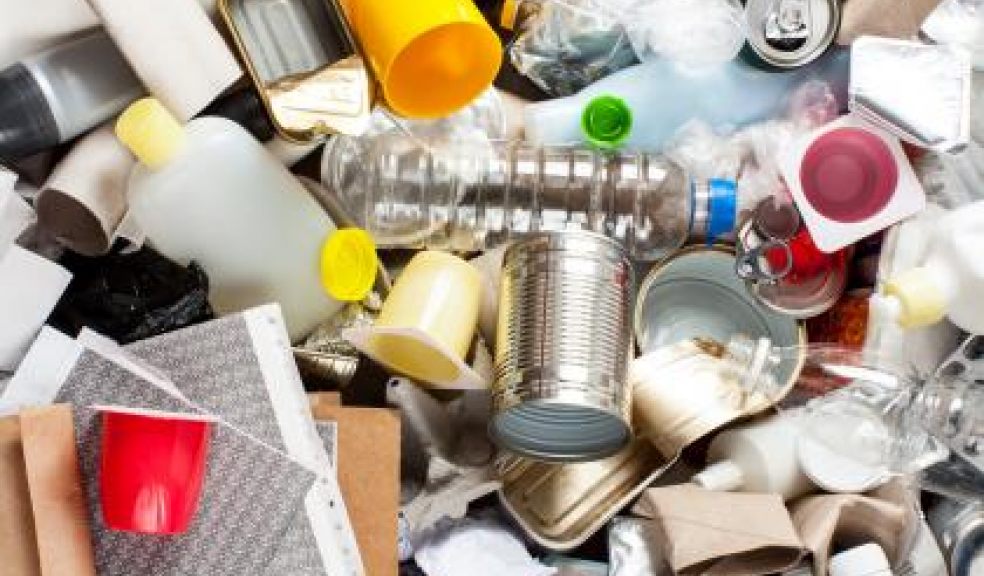
East Devon recycling collection trial start dates
As two East Devon communities prepare for trials to begin this month (September) to recycle more items for kerbside collections every week, district council officers were in Exmouth on Saturday to give householders top tips on how they can reduce their waste.
Recycling officers held a road show at the Imperial Recreation Ground in the town to give advice and help residents reduce, reuse and recycle.
Nearly 40 Exmouth residents, as well as East Devon District Councillor Pat Graham and Councillor Tim Dumper from Exmouth Town Council attended the recycling road show. Officers received positive feedback from locals, who are keen to help make the trials a success and are delighted with the increased recycling opportunities, especially cardboard. Concern was expressed about recycling bags not being seagull or cat proof. East Devon’s Streetscene were described by one resident as: “Brilliant – very responsive when needed.” Another resident said: “We are grateful for the service we get and want to make sure we do our bit to help.”
In the next few weeks, East Devon District Council will be introducing trial recycling and waste collections for 1,800 households in Feniton and Exmouth (The Colony).
Residents in these areas will be able to recycle more than ever before as cardboard and mixed plastics, such as margarine tubs and yoghurt pots, are being added to the extensive number of items that the council already collects from the kerbside each week. Every household in the trial areas will receive an additional 70 litre reusable sack which they can use for their recyclables along with their usual green recycling box.
The council will also continue to collect food waste every week as well to help householders throw out less waste in their grey residual waste bins. As part of the trials, grey waste bins will be collected every three weeks instead of every two weeks as they currently are now.
A wide-ranging campaign to explain and help residents with the changes has been running since late June. Recycling road shows have been held in each trial area, all householders have been sent letters and leaflets giving information on the new collections and there has been a comprehensive media campaign.
In the past fortnight, residents have been sent the dates for the new collections.
For Exmouth (The Colony), the last recycling & waste collection day under the old collection scheme is Thursday September 10. The first new collection of recyclables to include cardboard and mixed plastics is on Thursday September 17. Recycling and food waste – to include the new recyclable items - will be collected every week from this date. The next collection of waste from the grey waste bins will be Thursday October 1. Grey waste bins will be collected once every three weeks from this date.
For Feniton, the last recycling & waste collection day under the old collection scheme is Wednesday September 16. The first new collection of recyclables to include cardboard and mixed plastics is on Wednesday September 23. Recycling and food waste – to include these new recyclable items - will be collected every week from this date. The next collection of waste from the grey waste bins will be Wednesday October 7. Grey waste bins will be collected once every three weeks from this date.
The trials are being introduced in the two areas as the council prepares for the start of a new recycling and waste collection contract next year. The council spends around a quarter of its budget - £4.7million - on the recycling and waste contract, collecting from 66,000 households every week. Currently, the district recycles 44% of its waste and the council is aiming for at least a 50% recycling rate.
The council is also responding to calls from its residents, through its Viewpoint Surveys, to help them recycle more items every week. Residents’ feedback and information from the trials will help the council make a decision on any future changes to the current recycling and waste service for the whole district.
Cllr Iain Chubb, East Devon District Council’s portfolio holder for the Environment, said: “Our householders are already among the best in the country for producing less waste and we think this is an ideal opportunity to help them recycle even more. Over the last few months I have spoken to so many people who want to reduce their waste and recycle more and this trial will help us achieve that ambition.
“Cardboard and mixed plastics make up a fair proportion of a household’s residual waste every week. By collecting these items for recycling every week, along with the extensive number of recyclables we already collect, we believe that a household’s residual waste will decrease quite substantially.
“We want to help residents do the right thing and recycle more so that we deliver a more sustainable recycling and waste collection service that benefits the environment and is economically viable.”
Several other councils and waste partnerships have carried out trials similar to the one East Devon plans to introduce. Falkirk, Bury and Gwynedd Councils have already implemented three weekly waste collections across their areas, and Falkirk has just approved plans to move to four weekly waste collections.
The council has a dedicated team of officers working on the trials who will be helping residents and gathering information throughout. They can be contacted on 01395 571515 or email csc@eastdevon.gov.uk. For further information you can also visit the website at eastdevon.gov.uk and you can follow East Devon District Council on twitter @eastdevon or facebook /eastdevon for updates.
From mid- September residents in the trial areas will be able to recycle:
• Cardboard - Printed card, egg boxes, inner tubes from toilet and kitchen rolls, brown cardboard boxes, card from packaging such as toys and electrical goods, all cardboard food packaging (cereal packets, cardboard sleeves)
• Mixed plastics - Margarine and ice cream tubs, yoghurt pots and food packaging e.g. meat & veg trays.
• Plastic bottles – Milk containers, drinks, cleaning and product bottles
• Textiles - Clothes, sheets and blankets, curtains and towels
• Glass – Glass bottles, glass jars
• Household batteries
• Paper – Newspapers and magazines, bagged shredded paper, junk mail/envelopes, writing paper
• Metals – Food and drink cans, pet food cans, foil wrap and trays
• Empty aerosols
• Food waste - Fruit and vegetable peelings, cooked food, uncooked food, meat and fish, plate scrapings, tea and coffee grounds, cat and dog food.

















